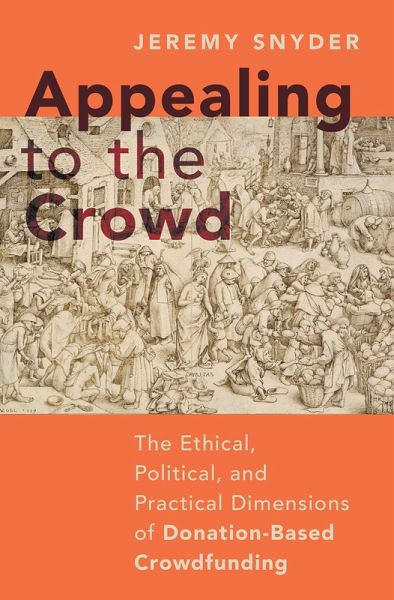
Appealing to the Crowd (eBook, PDF)
The Ethical, Political, and Practical Dimensions of Donation-Based Crowdfunding
Versandkostenfrei!
Sofort per Download lieferbar
0,00 €
inkl. MwSt.
Weitere Ausgaben:

PAYBACK Punkte
0 °P sammeln!
This is an open access title available under the terms of a CC BY-NC-ND 4.0 license. It is free to read on Oxford Academic and offered as a free PDF download from OUP and selected open access locations. This book offers a close examination of the ethical, political, and practical dimensions of donation-based online crowdfunding for basic needs including medical treatment, housing, food, and education. Crowdfunding uses online platforms and social networks to raise money from friends, family, and complete strangers for a variety of projects and needs. This practice has grown massively worldwide...
This is an open access title available under the terms of a CC BY-NC-ND 4.0 license. It is free to read on Oxford Academic and offered as a free PDF download from OUP and selected open access locations. This book offers a close examination of the ethical, political, and practical dimensions of donation-based online crowdfunding for basic needs including medical treatment, housing, food, and education. Crowdfunding uses online platforms and social networks to raise money from friends, family, and complete strangers for a variety of projects and needs. This practice has grown massively worldwide in recent years in terms of the numbers of crowdfunding campaigns and donors, money raised, visibility, and cultural influence. While the money raised through crowdfunding has helped millions of recipients, there is also reason for concern around how it may undermine campaigners' privacy and dignity, mirror and exacerbate social inequities, mask and deepen social injustice, defraud donors, and spread misinformation and hate. Author Jeremy Snyder places this discussion of crowdfunding in the wider historical and ethical context of giving practices. In doing so, Snyder shows that crowdfunding can repeat and exacerbate problems with traditional giving practices while creating other, new problems. Snyder concludes by presenting nine values that should guide donation-based crowdfunding: benefit, choice, solidarity, privacy, dignity, equity, social justice, non-maleficence, and accountability. These values can help crowdfunding donors, campaigners, recipients, platforms, and policy makers preserve the good that can come from crowdfunding while addressing some of its many negative aspects.
Dieser Download kann aus rechtlichen Gründen nur mit Rechnungsadresse in A, B, BG, CY, CZ, D, DK, EW, E, FIN, F, GR, HR, H, IRL, I, LT, L, LR, M, NL, PL, P, R, S, SLO, SK ausgeliefert werden.













